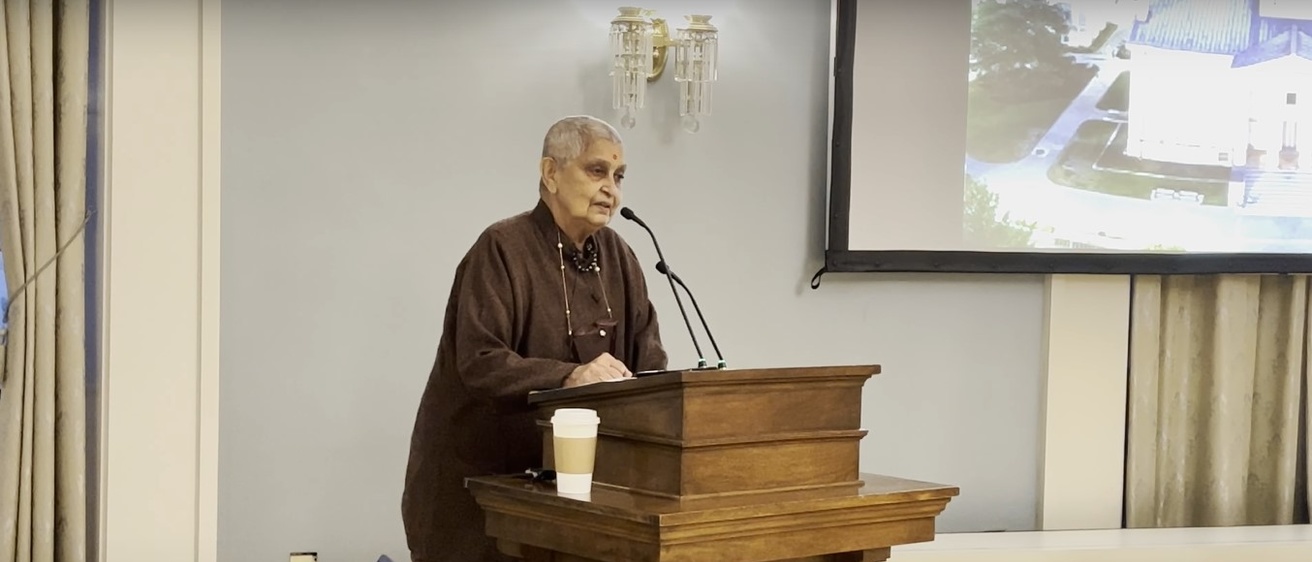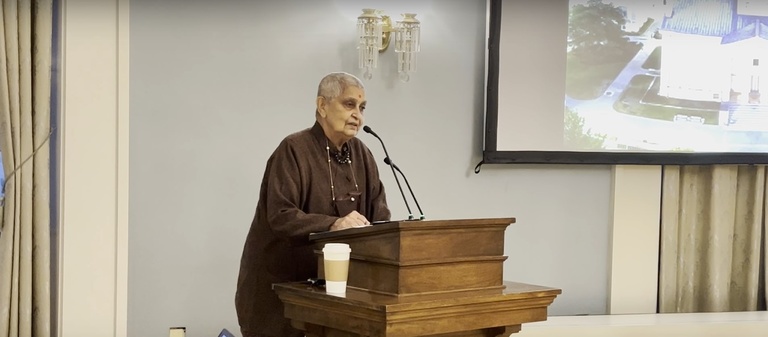Gayatri Chakravorty Spivak, the world-renowned scholar, literary theorist and translator delivered her lecture, “Translation! Ever New, Ever Elusive” to a standing-room audience at the Old Capitol Senate Chamber on October 12, 2023.
Spivak’s talk was given in celebration of the 50th anniversary of the Literary Translation program and the 60th anniversary of the Iowa Translation Workshop. At the event, which was made possible by the Maureen Robertson Fund, Spivak spoke of her experience in co-founding the UI’s MFA in Literary Translation, together with Daniel Weissbort. She also spoke about her own translations and translation theory and invited the University of Iowa to remain firm in its commitment to being a leader in the field of Literary Translation.
After introductions by Aron Aji, Director of Translation Programs, and Steven Unger, Professor Emeritus of Cinema, French Studies, and Comparative Literature, Spivak began her lecture by sharing the June Jordan poem, “Moving Towards Home,” and by saying, “I speak in the name of peace.” Spivak echoed Jordan’s poem by stating:
“I was a Black woman. Now I am a Palestinian,” and continuing, “…as I, Gayatri Spivak, am a Lohar, a Rohingya, a Santhal. That is translation. Peace is translating myself into others’ spaces in order to translate. Translating here is the literary. You notice I use translating—as I do reading—as an engagement in an active activity, not turning out a passive convenience for others. That’s where the exclamation point in my title comes from. Translation!”
Encountering themselves in the language of others was the spirit with which she and Weissbort created the Literary Translation MFA, she said. Spivak went on to teach for 12 years at Iowa, during which time she translated the work of Jacques Derrida, and built the Translation and Comparative Literature programs by hiring Unger, Robertson, among other professors.
Spivak characterized the sharing of her lecture as a kind of homecoming because translation continues to thrive at Iowa. She said, “For translation, in its broadest sense, is the only way to mend this broken world, although never permanently; for each generation needs to be taught the practice of translation as practice of bound freedom, from metaphoric to literal, to have its desires rearranged from corporate greed, violence toward the other, and fear of the repressed.”
Spivak continued by urging translators, and especially postcolonial translators, to avoid translating from English translations, but rather to devote themselves to the study of language, so that the translation from original languages will be possible. She said, “Where translation is necessary, we are produced. Where translation is impossible, we surrender actively to the impossibility to make our practice stronger. Where translation is a task, we forget the first two, and hunker down to be as responsible to the original as possible. In this translating, we must not translate from the imperial language translations of other texts…Don’t let English help you avoid intellectual labor learning to love the language of the underived original. Necessary and impossible. Claim it as a task. Get yourself invited to an adventure.”
Spivak concluded her lecture with a look toward the next 50 years of translation at Iowa.
A recording of Spivak’s lecture is available to watch in full here.

